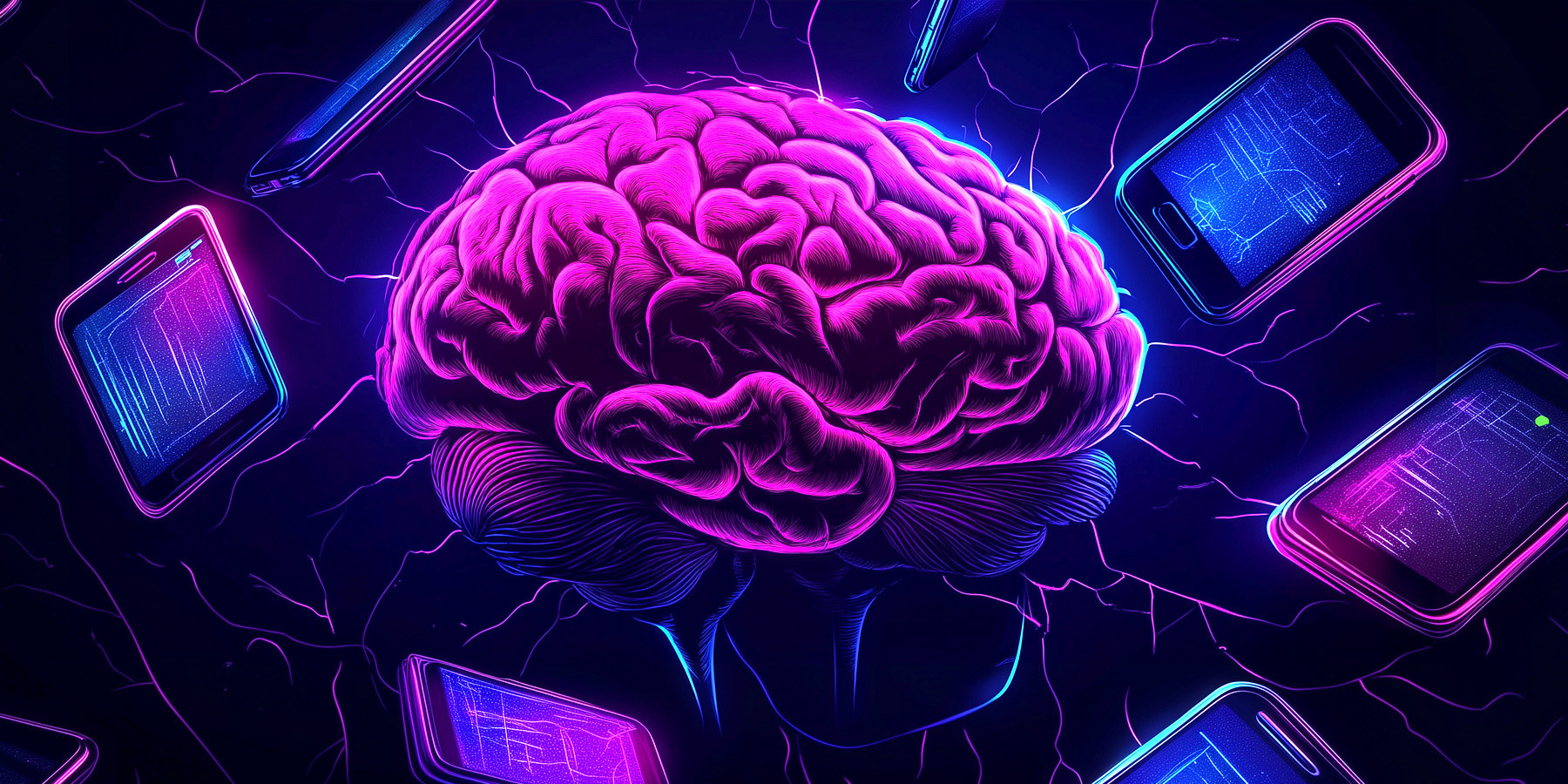

How Reducing Phone Usage Can Unlock Peak Brain Performance: A Simple Habit for High Achievers

In today’s hyper-connected world, our phones are never more than a few inches away. We check them first thing in the morning and right before bed, constantly scrolling through social media, emails, and notifications. But have you ever stopped to consider the true impact of this constant digital engagement on your brain’s performance? While we’re all aware of the physical tolls of poor habits like unhealthy eating and lack of exercise, many overlook the damaging effects of excessive phone usage on brain health. By moderating your phone use—especially during critical times like the start and end of the day—you can optimize your brain's electrical connectivity, improve mental clarity, and elevate your performance across all areas of life. This simple change could be the game-changer you’ve been searching for.
The Hidden Dangers of Constant Phone Use on Brain Health
Phones and Brain Distraction
Constant phone use fragments attention, which can lead to decreased cognitive function and lower mental clarity. Every notification interrupts the brain’s flow, making it harder to concentrate on complex tasks that require deep focus. Over time, the brain’s ability to enter deep, uninterrupted work states becomes impaired. Phones demand our attention constantly, and these distractions can add up, preventing us from achieving a state of “flow” where we can be at our most productive and creative. The more we check our phones, the harder it becomes to engage in high-focus tasks that require sustained mental energy.
Impact on Emotional Regulation
The dopamine hits from social media and notifications can train the brain to seek constant stimulation, affecting emotional balance. This leads to increased stress levels, anxiety, and decreased ability to manage emotions effectively, further hindering peak performance. This constant chase for novelty and external validation from our devices is a mental drain that can increase our emotional reactivity. The result is that we may find ourselves more prone to stress, irritability, and burnout, diminishing both personal and professional well-being.
Effects on Cognitive Functioning
Research has shown that multi-tasking (like constantly switching between apps) diminishes the brain’s ability to focus and solve problems efficiently. Phones can also contribute to mental fatigue, as the brain is constantly processing irrelevant information, preventing it from operating at its full capacity. The overload of incoming information not only disrupts concentration but can lead to cognitive burnout, making it harder to think clearly or perform complex tasks. By reducing phone distractions, you allow your brain to reset and refocus on what truly matters.
The Science Behind Brain Optimization: Why Less Is More
Electrical Connectivity and Brain Function
The brain is mostly electrical, and optimizing its electrical connectivity is key to better performance. Too much distraction leads to poor wiring in brain circuits, making it harder for neurons to communicate efficiently. By reducing external stimuli (like your phone), you allow the brain’s electrical pathways to function optimally. The idea that the brain is a network of electrical signals explains why phone distractions affect mental performance. When the brain is constantly disrupted by notifications, it has to continually readjust, leading to inefficiencies. By cutting out these disruptions, the brain can work more effectively and with greater clarity.
How Phone Overload Affects Your Brain’s Wiring
Frequent phone usage can overwhelm the brain’s neural pathways, leading to cognitive overload. This disrupts your brain’s natural ability to operate smoothly. When you reduce phone usage, the brain’s circuits are less distracted and can focus on higher-level tasks more effectively, leading to improved clarity, memory, and problem-solving. Phone distractions fragment our attention, pulling us away from important tasks. Each switch between apps or notifications interferes with the brain’s ability to stay on task, weakening the wiring necessary for high-performance mental work. By reducing phone usage, we help our brain operate more cohesively and effectively.
Sustained Cognitive Improvement
The less your brain is bombarded by irrelevant information, the better it can process essential tasks, leading to improved performance in both work and personal life. As your brain’s electrical pathways become less disrupted, cognitive abilities like memory, focus, and decision-making improve. This leads to a more consistent and sustainable performance, allowing for better problem-solving and creativity. Over time, this shift can have a profound impact on your productivity and overall mental well-being.
Practical Strategies for Moderating Phone Use
Create Phone-Free Time Blocks
Start your day without reaching for your phone. Instead, use the first 30 minutes to engage in a routine that supports mental clarity—whether it’s meditation, journaling, or physical activity. Similarly, designate the last 30 minutes of your day as phone-free to wind down and prepare your brain for rest. By establishing these boundaries, you create space for your brain to start and end the day in a focused, undistracted state. This ensures that your brain enters the day with clarity and prepares to rest at night, improving both mental focus and sleep quality.
Set Boundaries for Phone Use
Set specific times throughout the day to check emails or social media. Use apps that limit your screen time and track your usage. Implement a “no phone” rule during deep work sessions or meetings to foster focus and productivity. By setting clear boundaries, you reduce the temptation to check your phone mindlessly throughout the day. This structured approach ensures that your brain can focus on important tasks without constant interruptions.
Establish a Digital Detox Routine
Dedicate certain days or weekends to phone detoxes. Use these times to reconnect with people in person or engage in activities that nurture your brain’s natural ability to recharge. Experiment with turning off notifications or using "Do Not Disturb" modes to limit constant disruptions. A digital detox helps you break free from the constant cycle of phone use, providing your brain with the rest it needs to recover. This can lead to greater mental clarity and improved overall performance.
How Reduced Phone Use Can Enhance Emotional and Mental Clarity
Regaining Control Over Emotions
When the brain is less stressed by constant digital stimulation, it becomes better at regulating emotions. This leads to more resilience in the face of challenges, both in personal and professional life. By minimizing phone distractions, you’re giving your brain a chance to reset emotionally. This allows for better emotional regulation, reducing stress and anxiety, which ultimately leads to improved decision-making and interpersonal relationships.
Improved Mental Clarity and Focus
By reducing phone distractions, you give your brain the opportunity to enter “flow” states—those periods of deep concentration and effortless productivity. This mental clarity translates into higher efficiency in problem-solving, creativity, and achieving long-term goals. Phones break the flow state by constantly interrupting thought processes. With fewer interruptions, your brain can focus on solving problems and producing creative ideas without unnecessary distractions.
Better Sleep and Recovery
By turning off your phone before bed, you reduce blue light exposure, which interferes with circadian rhythms and disrupts sleep quality. Quality sleep is essential for brain function, as it is during sleep that your brain consolidates memories and clears out toxins. The habit of ending the day without phone usage sets your brain up for better sleep. By improving sleep quality, you improve cognitive function the next day, creating a cycle of peak performance.
Simple Takeaways for Optimizing Brain Performance with Phone Usage
Small Adjustments Lead to Big Results
Start small—create just 30 minutes of phone-free time in the morning and evening. Gradually increase this as you experience its benefits. Small changes can have a big impact on your mental performance.
Track and Adjust
Use phone usage-tracking apps to monitor how much time you spend on your phone. Challenge yourself to reduce this by a set percentage each week and track how it affects your performance and well-being.
Consistency is Key
The more consistent you are with moderating phone use, the greater the positive impact on your brain’s electrical connectivity, focus, and emotional stability.
Share Your Progress
Share your experience with friends, colleagues, or on social media. Creating a supportive community can help keep you accountable and inspire others to make similar changes.
Harnessing the Power of Your Brain for Success
By minimizing phone distractions, you’re not just optimizing your brain for better focus or clarity—you’re setting yourself up for sustainable, high-level performance in all aspects of your life. The way to achieve lasting success isn’t through constant hustle or more caffeine—it’s through reducing the noise and allowing your brain the space it needs to function at its peak. By taking control of your phone usage, you're taking control of your brain’s performance. So, what’s stopping you from making that first move today?
















